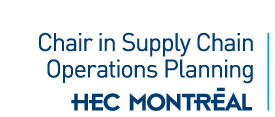Introduction
The Chair’s research program focuses on optimization methods applied to supply chain operations planning problems. The three main areas are production planning, integrated production and transportation planning, and planning under uncertainty. These planning problems are relevant for many manufacturing companies as optimized planning helps them to reduce costs and maintain their competitiveness. In terms of methodology, the projects focus on solving planning problems using linear and integer programming models. We will formulate new mathematical models for different problems and develop new and effective solution algorithms. The objectives of this research program are: 1) to conduct high-quality research in the area of operations planning; 2) to supervise graduate students during their research training; 3) to apply this research to industrial problems.
Scientific Program
In a supply chain, there are several consecutive stages: purchasing, production, distribution and sales. Activities related to these steps must be planned in advance. Typically, the production plan is developed based on demand forecasts. Once this production plan is determined, upstream activities (i.e. the supply of the components needed) and downstream activities (i.e. the distribution of end products to customers) are planned. In today’s environment, we observe significant transformations in the area of supply chain management, including digitalization, e-commerce, resource sharing and collaboration between different partners. These issues are capturing the interest of industrial partners. Supply chains need more flexibility and responsiveness, and in addition, they need to be cost-competitive. Careful planning is essential to achieving these goals, but this is also becoming very complex. Supply chain operations planning faces several important new challenges.
First, in production planning, there are many operational aspects that make this planning very complex such as the presence of different resources with limited capacity, the need for costly and time-consuming setups, production at multiple levels, perishability of products, etc. A first important challenge is to properly represent these complexities in mathematical models in order to capture the reality of the production processes.
Second, purchasing, production and distribution are consecutive steps in a supply chain. Typically, the planning of these steps is done in a consecutive and isolated way. However, global savings can be achieved by planning these steps together in a collaborative framework. Integrating production planning models with upstream and downstream activities, including transportation, is a second important challenge.
A third major challenge in operational planning is the presence of uncertainty, for example with respect to the demand or supply. The challenge is to make quality decisions when key parameters are not yet known and at the same time consider the best recourse decisions to be made once more information is obtained.
The three main application areas of the chair’s research program are directly related to these three challenges.
